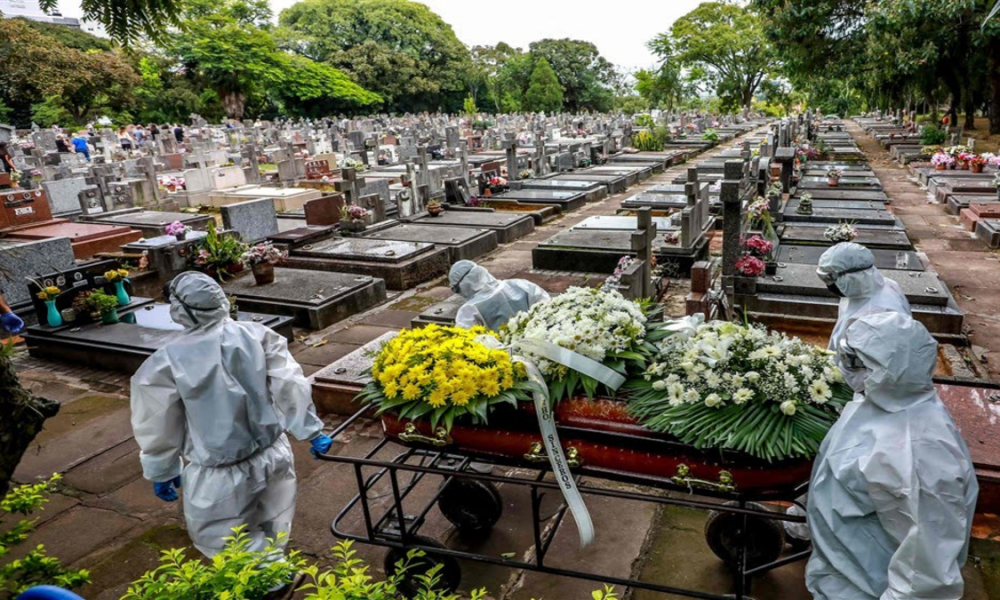Approximately 1,300 babies in Brazil have died since the beginning of the pandemic. This statistic defies overwhelming evidence that COVID-19 rarely kills children.
What We Know:
- Last year, Jessika Ricarte noticed something was off about her one-year-old son, Lucas. First, he lost his appetite. After his godmother, a nurse, suggested he had a sore throat, he developed a fever. The appetite loss and fever transformed into fatigue and labored breathing. Jessika took Lucas to the hospital and asked for a COVID test. Although an oximeter indicated that Lucas’ blood oxygen levels were at 86%, the doctor would not administer a test. Lucas was not feverish at the time, and the medical professional stated COVID-19 was rare in children. He sent Jessika home with antibiotics, but it did not help her son.
- The symptoms reduced, but Lucas’ tiredness did not. Weeks went by and his condition kept getting more aggressive. Jessika returned to the local hospital, where they finally tested her son. Lucas tested positive. Officials transferred Lucas to a pediatric intensive unit in Sobral, over two hours away. Lucas received a diagnosis of multi-system inflammatory syndrome (MIS). Despite a month’s treatment and multiple attempts to save his life, Lucas ultimately lost his battle with the coronavirus. Dr. Manuela Monte, the pediatric doctor who attended Lucas, said she was shocked by the severity of his condition, as he did not have any risk factors.
- While the Health Ministry reports that 800 children under 9-years-old have died of COVID-19, experts say the death toll is higher. This might be from a lack of widespread testing, little contact tracing efforts, and vaccine shortages. University of São Paolo epidemiologist Dr. Fatima Marinho estimates that 2,060 children under 9, including 1,302 babies, have died. The senior adviser to the international non-governmental Vital Strategies says she based her prediction on the number of deaths from an unspecified acute respiratory syndrome throughout the pandemic.
- Marinho debunked the misconception that children are not at-risk for COVID-19. She told BBC that there have been 10 times more deaths from the unexplained disease over the past year. They are low-risk for the coronavirus, but the scale of the epidemic increases the chance of younger people becoming ill. Additionally, she saw a rise in MIS cases among children. NBC says the newly identified and serious health condition is associated with the virus that causes coronavirus infections. MIS affects children up to six weeks after they are contaminated.
- Médecins Sans Frontières (Doctors Without Borders) declared on Thursday the Brazilian government’s “failed response” led to thousands of avoidable deaths. MSF President Dr. Christos ChrIstou shamed President Jair Bolsonaro for his lack of prioritizing throughout the pandemic. The right-wing leader dislikes lockdowns and holds large events without wearing a mask. It was not until March that he began to consider vaccines as an option.
“Each week there is a grim new record of deaths and infections — the hospitals are overflowing, and yet there is still no coordinated centralized response,” said Christou.
- Christou expects the situation to worsen during the next weeks if nothing changes. He reprimanded the country for refusing to “adapt evidence-based public health measures.” According to Christou, Brazil needs a fast, science-based, and well-coordinated reset. Doing so will prevent deaths and the destruction of the “once prestigious Brazilian health system.”
- MSF warned of an unfolding “humanitarian catastrophe.” The high number of cases has damaged hospitals. Many are faced with basic medicine and oxygen supply shortages. Sao Paolo’s health secretary Jean Carlo Gorinchteyn said Brazil’s situation was dire in its most populous state. Officials warned that more than 640 hospitals could possibly collapse. Gorinchteyn further asked for the government’s support. He adds it is not only necessary for Sao Paolo, but also for the entire country.
Since the beginning of the COVID-19, Brazil’s record of cases stands at more than 13.5 million cases. 365,444 citizens have died from the disease, as shown in data from John Hopkins University from April 15. Just last week, more than a quarter of COVID deaths came from Brazil; it is the country with the second-highest number of deaths behind the United States of America. An increase in COVID-19 tests can protect many more Brazilian children from being like Lucas.


